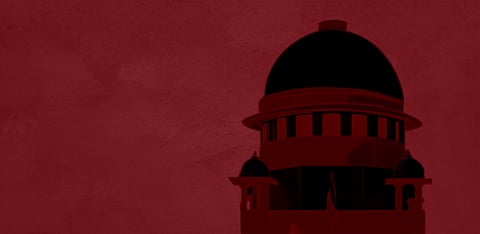

In its statement, the Campaign for Judicial Accountability and Reforms says that the Chief Justice's Bench is not an appellate court over the final judgments and orders of other Benches of the Supreme Court.
—
THE Campaign for Judicial Accountability and Reforms (CJAR) has questioned the propriety and lack of jurisdiction of a recent order dated May 1 of a two-judge Bench of the Supreme Court comprising Chief Justice of India (CJI) Dr D.Y. Chandrachud and Justice J.B. Pardiwala. The order had directed all courts to defer beyond May 4 the hearing on applications filed before them seeking default bail on the basis of a recent decision by another co-ordinate Bench of the Supreme Court comprising Justices Krishna Murari and C.T. Ravikumar.
On May 4, the former Bench, which also included a third judge, Justice P.S. Narasimha, extended the interim stay it had granted on May 1 till May 12.
CJAR is a Delhi-based civil society watchdog which has some of India's most prominent human rights activists and lawyers among its patrons and executive committee.
In a statement published earlier today, the CJAR says that the Chief Justice's Bench is not an appellate court over the final judgments and orders of other Benches of the Supreme Court. It has thus sought recall of the order passed by the CJI-led Bench on May 1 and May 4.
The CJAR claims that the recall application against a final judgment of the Supreme Court was not maintainable and ought not to have been registered by the registry of the Supreme Court.
"The only remedy for the Union of India, if it was aggrieved by this final judgment, is filing a review application under Article 137 of the Constitution. Such a review application under the Supreme Court Rules, if the Bench is still available (with none of the judges having retired, etc.), ought to be listed in the chambers before that same Bench that passed the judgment sought to be reviewed," the statement says.
It adds that institutional integrity demands that any departure from this convention, if at all, ought to be done only by means of a reasoned order.
The orders passed by the CJI's Bench, the CJAR states, in the recall application, with the first one coming upon being mentioned by the Solicitor General of India, show that the CJI's Bench has effectively condoned this brazen act of forum-shopping and Bench-hunting by the Union government.
"In an equally improper manner, it has acted like an appellate court, listing the recall application before a different Bench; and directing all lower courts to defer default bail applications relying on the judgment in Ritu Chabbria," the statement further states.
On the judgment by the Bench of Justices Murari and Ravikumar, the CJAR says that it has no comment to offer on whether the facts in the case justified the selection of the issues that were considered by the Bench, but adds that the judgment is indisputably a welcome one, lays down the correct law consistent with the fundamental rights chapter of the Constitution, and that it would be a travesty if the decision were eventually overturned.
"The main thrust of this statement, however, is not in the merits of the judgment itself, but the manner in which the subsequent recall proceedings have been handled," the CJAR clarifies.
On April 27, the Bench comprising Justices Murari and Ravikumar held that a chargesheet, if filed by an investigating agency without first completing the investigation, would not extinguish the right of an accused to default bail. The Bench had reiterated that the right of default bail under Section 167(2) of the Criminal Procedure Code is not merely a statutory right, but a fundamental right that flows from Article 21 (right to life and liberty) of the Constitution.
"If we were to hold that chargesheets can be filed without completing the investigation, and the same can be used for prolonging remand, it would in effect negate the purpose of introducing Section 167(2) of the CrPC and ensure that the fundamental rights guaranteed to accused persons [are] violated," the Bench had noted.
However, on May 1, the Division Bench comprising CJI Dr Chandrachud and Justice Pardiwala directed all courts to defer beyond May 4 the hearing on applications filed before them seeking default bail citing the decision by the co-ordinate Bench headed by Justice Murari. The CJI-led Bench was hearing a recall application filed by the Union government against the judgment authored by Justice Murari.
The CJI-led Bench was also hearing an appeal filed by the Directorate of Enforcement against the Delhi High Court's order on April 28 directing the release of an accused citing Justice Murari's judgment.
Supreme Court advocate Prasanna S. had taken to Twitter to opine that the CJI-led Bench passing such an order committed extraordinary impropriety, adding that the CJI's bench is not an appellate court over another Supreme Court Bench.
Constitutional law scholar and lawyer Gautam Bhatia had criticised the order as well, writing that "it creates a precedent where— in the future— if the State is displeased by a judgment, instead of filing a review, or persuading another coordinate bench of its point of view in adversarial proceedings, it can simply approach the Chief Justice ex parte, on an oral mentioning, and secure a hearing before a larger bench to 'recall' the unfavourable order. This effectively puts the precedent of the court entirely at the mercy of the predilections of a particular Chief Justice."